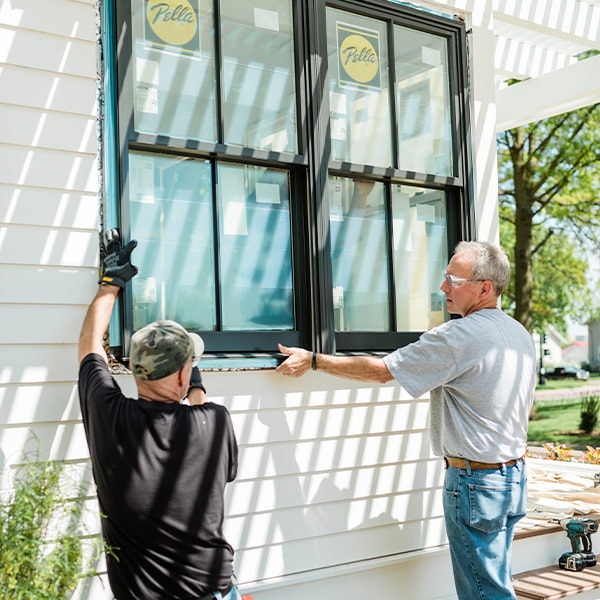Upgrade Your Home With Energy-Efficient Home Window Replacements
In the realm of home renovation, the decision to update to energy-efficient window substitutes can dramatically affect both the capability and aesthetic appeals of a house (Spring window replacement). As house owners seek methods to enhance the performance and sustainability of their home, the choice of home windows plays an essential function in accomplishing these goals. Past the surface degree of mere looks, energy-efficient windows offer a wide range of benefits that go beyond plain aesthetic allure. With a cautious choice process that considers different factors, from glass types to installment strategies, beginning on this home upgrade journey can confirm to be a transformative venture.
Benefits of Energy-Efficient Windows

The installment of energy-efficient home windows offers considerable cost savings on energy expenses while boosting ecological sustainability. Energy-efficient home windows are created to minimize warmth loss and gain, minimizing the requirement for home heating and cooling down systems to burn the midnight oil. By properly shielding the home, these home windows aid preserve a comfortable indoor temperature year-round, causing reduced power consumption and lowered utility prices. Additionally, energy-efficient windows can help manage dampness degrees within the home, minimizing the threat of mold and mildew and mold growth.
Past the monetary benefits, energy-efficient home windows contribute to environmental sustainability by reducing carbon discharges associated with energy production. Overall, investing in energy-efficient home windows not just boosts the comfort and performance of a home but additionally aligns with environmentally conscious practices.
Sorts Of Energy-Efficient Glass
Different sophisticated kinds of energy-efficient glass offer special residential properties that cater to different demands and preferences in improving the sustainability and performance of structures. Triple-pane glass, consisting of three layers of glass with protecting gas in between them, offers improved thermal insulation, making it very energy-efficient. Furthermore, self-cleaning glass with a special layer that breaks down and loosens dirt when subjected to sunshine can minimize upkeep requirements and maintain windows looking clean.
Factors to Think About When Selecting
When considering energy-efficient home window substitutes, it is vital to carefully analyze particular factors that straighten with your sustainability purposes and desired energy savings. One crucial variable to think about is the window's power performance scores, such as the U-factor and Solar Warm Gain Coefficient (SHGC) The U-factor actions just how well the window protects, with reduced numbers showing better insulation, while the SHGC suggests the window's ability to block heat from sunlight. In addition, the window framework product plays a substantial role in energy performance. Products like fiberglass, vinyl, or timber with thermal breaks are excellent selections for reducing warmth transfer. Another important consideration is the home window style and orientation worrying sunlight exposure. Selecting the right home window style and purposefully putting them can optimize natural light while lessening warmth gain or loss. Last but not least, setup quality is key to making certain the home windows perform as planned. Correct setup assists protect against air leak, making sure ideal power effectiveness. By very carefully evaluating these elements, you can select energy-efficient home windows that improve convenience, decrease energy expenses, and profit the environment.
Installation and Upkeep Tips

Routine maintenance is key to preserving the performance of your energy-efficient windows. Inspect the home windows occasionally for any type of signs of sealer, damage, or wear degeneration. Tidy the frameworks, tracks, and glass frequently making use of mild soap and water to get rid of dirt and grime that can impact efficiency. Examine the weather-stripping and seals for any kind of spaces or tears and replace them if required to maintain the home windows' power performance.
In enhancement, oil relocating components such as locks and hinges to make certain smooth procedure. By complying with these installation and upkeep tips, you can enhance the energy efficiency of your home and extend the life expectancy of your energy-efficient windows.
Cost-Benefit Evaluation of Upgrading

Energy-efficient home windows are made to reduce heat transfer, lowering the demand for heating and cooling systems to burn the midnight oil. This can cause substantial cost savings on power expenses, particularly in regions with severe temperature levels. In addition, energy-efficient windows can boost the general value of your home, making it much more eye-catching to potential customers if you choose to offer in the future.
When calculating the cost-benefit evaluation, element in the possible savings on energy bills, any offered incentives or discounts, and the lifespan of the windows. While the first cost may be greater, the long-term savings and benefits of energy-efficient windows make them a wise financial investment for home owners wanting to improve their residential property's energy effectiveness and worth.

Conclusion
Finally, updating to energy-efficient window substitutes supplies many benefits such as decreased power usage, enhanced convenience, and expense financial anchor savings. By picking the suitable kind of energy-efficient glass and considering variables like frame product and installation, home owners can take full advantage of the efficiency of their windows. Routine maintenance and appropriate installation Read More Here are essential for lasting performance. In general, the cost-benefit analysis of upgrading to energy-efficient windows shows that the first financial investment can lead to considerable savings in the long run.
When considering energy-efficient home window replacements, it is imperative to carefully analyze details factors that straighten with your sustainability goals and desired power cost savings. The U-factor steps how well the window shields, with lower numbers indicating much better insulation, while the SHGC shows the home window's capacity to block warmth from sunlight. By thoroughly evaluating these aspects, you can pick energy-efficient windows that enhance comfort, reduce energy prices, and benefit the setting.
While energy-efficient windows may have a greater upfront expense contrasted to traditional windows, the long-lasting benefits commonly i thought about this surpass the preliminary financial investment.In verdict, updating to energy-efficient window substitutes provides various advantages such as decreased power usage, boosted comfort, and cost financial savings.